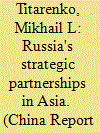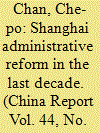| Srl | Item |
| 1 |
ID:
090286


|
|
|
|
|
| Publication |
2008.
|
| Summary/Abstract |
This article reflects on the experience of India's engagement with China in two multilateral forums: the Bangladesh-China-India-Myanmar (BCIM) Forum for Regional Economic Cooperation, formerly known as the 'Kunming Initiative', and the China-India-Russia Academic Trilateral Conference. Though both forums are so-called 'Track Two' ventures, the dynamics of the two exercises are rather different. As of now, the 'Trilateral' is rated relatively successful in so far as it has shown more substantial progress from 'Track Two' to 'Track One'. Tracing these brief histories, this article argues that academic cooperation should be seen to have value in and of itself, and not merely as the mechanism that propels a speculative, academic exercise into state-to-state policy.
|
|
|
|
|
|
|
|
|
|
|
|
|
|
|
|
| 2 |
ID:
090285


|
|
|
|
|
| Publication |
2008.
|
| Summary/Abstract |
Regional diplomacy is today a strong force around the world. China is an early mover in this field, while India has become one, in building its active Asian connections, mainly after the launch of its economic reforms in 1991. At present, the two countries collaborate in some regional bodies where they are members or observers, and this cooperation is likely to become stronger in the future, supported by objective circumstances and economic opportunities, and the growth in their bilateral economic exchanges. This will have beneficial consequences for Asia as a whole and also, for the world community.
|
|
|
|
|
|
|
|
|
|
|
|
|
|
|
|
| 3 |
ID:
090284


|
|
|
| 4 |
ID:
090282


|
|
|
|
|
| Publication |
2008.
|
| Summary/Abstract |
Since the last decade, the Shanghai government has carried out administrative reforms towards the goals of rationalisation and marketisation. Various reform measures have been implemented, including, for example, segregation of government and enterprises (zheng qi fen kai); reduction of administrative examination and approval (jianshao xingzheng shenpi); and devolving some of the government functions to the third sector. Among various measures, probably the setting up of a new local government in the Pudong New Area is the most significant. After the examination of different aspects of the Shanghai administrative reforms, we conclude that the goal of the reform has been set correctly but without enough bold and innovative attempts. We suggest that further administrative reforms in Shanghai should be implemented with more rationalisation and marketisation in order to build up a true market economy without administrative interference from the government.
|
|
|
|
|
|
|
|
|
|
|
|
|
|
|
|
| 5 |
ID:
090281


|
|
|
|
|
| Publication |
2008.
|
| Summary/Abstract |
As a scholarly discipline, criminology in China is growing in stature, maturity and utility. In the short thirty years since 1979, China has successfully established criminology as a scientific field of study with well-defined subjects, recognised scholars and copious research/publications. A cursory review of pertinent literature in law, criminology and China studies shows that to date, there are very few systematic and comprehensive studies of criminology (in English language) as an emerging and important field of academic discipline in China. As a result, we know very little about its focus and scope; direction and trend; theories and findings; and problems and issues. This is a first attempt to do so. The article (in two parts, published separately) investigates into: 'Literature on law, crime and punishment in China'; 'The idea of crime (Fanzui)'; 'Traditional thinking of crime and punishment in imperial China'; 'Nature and structure of criminology as a discipline'; 'Contemporary development of criminology in China'; 'Contemporary theories on crime and punishment' and 'Fundamental issues and challenges' facing criminological research in China.
|
|
|
|
|
|
|
|
|
|
|
|
|
|
|
|
| 6 |
ID:
090283


|
|
|
|
|
| Publication |
2008.
|
| Summary/Abstract |
The article analyses the development and growth of the rubber industry in China since the reforms began. It reflects the contradictions arising from the mismatch between growing shortage of rubber vis-à-vis the dynamic and spatial growth of rubber-based industries. The article suggests some important policy options for sustaining the growth dynamism of the rubber industry in China, in the era of economic integration, which calls for a thorough revamping of state policies and evolving (virtually non-existent) institutional intervention strategies addressing a broad spectrum of activities, namely (a) demand and supply management; (b) redefining the status of natural rubber as a strategic commodity and potential industrial raw material; (c) strengthening property rights status of the rubber small producers; and (d) capital investment for research and development (R&D), facilitating the expansion of natural rubber (NR) cultivation to non-conventional areas.
|
|
|
|
|
|
|
|
|
|
|
|
|
|
|
|